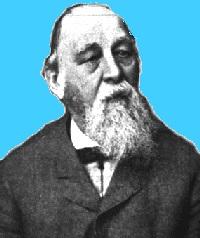1823 - 1869 Person Name: G. B. Bubier Author of "I would Commune With Thee, My God" in Northfield Hymnal No. 2 Bubier, George Burden, son of the Rev. William Bubier, born at Reading, Feb. 2, 1823. After serving for some time in a bank at Banbury, he prepared for the Congregational Ministry, at Homerton College. He was successively pastor of congregations at Orsett, Essex, 1844; Union Chapel, Brixton; Cambridge; and Hope Chapel, Salford, 1854. In 1864 he was appointed Professor of Theology and Philosophy at Spring Hill Congregational College, Birmingham. He died at Acock's Green, near Birmingham, March 19, 1869. In 1855 he was joint editor with Dr. George Macdonald, and the brother of the latter, of Hymns and Sacred Songs for Sunday Schools and Social Worship, in two parts, &c, Manchester, Fletcher and Tubbs, 1855. A great many of the 318 hymns in this collection have been repeated in later hymnals.
To that work he contributed 11 hymns under the signature "B." These, increased from other sources to 21, together with 6 Psalm Versions, were given with dates and in some instances with notes also, in his Hymns and Devotional Verses, Birmingham, 1867. Amongst those of his hymns in common use are:—
1. A fitly spoken word. Kind Words. Dated "January, 1855," and published in the Hymns, &c, as above, No. 285, in 6 stanzas of 4 lines. Also in Hymns and Devotional Verses, 1867, p. 14. Given in Horder's Congregational Hymns, 1884.
2. Blest be the God of love. Sunday Evening. Written in "June, 1855," and published in Hymns, &c, in 6 stanzas of 4 lines as above; Hymns and Devotional Verses, 1867, Horder, 1884, and others.
3. Great is Thy mercy, Lord. Chosen by Christ. Dated "January, 1854," and published in the two works as above, in 5 stanzas of 4 lines. In Horder, 1884.
4. I would commune with Thee, my God. Longing for God. This is the most popular of this author's hymns, and is given in several collections. It was written "February 2nd, 1854," in 4 stanzas of 4 lines. It is in both the Hymns, &c, 1855, and the Hymns and Devotional Verses, 1867. Original text in Baptist Hymnal. 1879, No. 376.
5. My God, I love Thee for Thyself. Love to God. This is not in the Hymns, &c, 1855. It is dated "June 13th, 1857" in his Hymns and Devotional Verses, 1867, p. 22. It is given in the Baptist Hymnal, 1879, Horder, 1884, and others. [Rev. F. J. Falding, D.D.]
-- John Julian, Dictionary of Hymnology (1907)
George B. Bubier


 My Starred Hymns
My Starred Hymns



